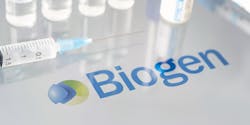US Pharma Firm Biogen Settles for $900 Million with Whistleblower in Bribe Case
U.S. pharmaceutical company Biogen has reached a $900 million settlement with a whistleblower who accused the firm of having paid bribes to doctors to encourage them to prescribe its drugs against multiple sclerosis.
The whistleblower behind the report, Michael Bawduniak, will receive about $250 million directly, according to a statement released Monday by the U.S. Justice Department.
The rest will essentially go to the federal government, and a smaller part -- $56 million -- to 15 American states that had joined the lawsuit, to which the agreement puts an end.
Bawduniak, a former marketing executive at Biogen who left the company in 2012, took legal action using the False Claims Act, which authorizes a private citizen to sue in civil cases on behalf of the US government if it appears that the state has been financially cheated by an individual or a legal entity.
The law allows for the whistleblower to receive part of any compensation awarded by the courts.
In the case of Biogen, approximately 30% of the cost of treatments related to multiple sclerosis is covered by the Medicare, the federal health coverage program dedicated to people aged 65 and over.
According to documents on file, the other major U.S. government program, Medicaid, supports about 10.5% of patients with the disease who are under age 65.
Biogen was accused of paying millions of dollars a year in kickbacks to doctors to get them to prescribe its drug Avonex, whose sales were declining, and its new treatment, called Tysabri.
Several other drugs for treating multiple sclerosis were in competition with Biogen's products and were considered, according to the prosecution, to be just as effective.
In addition, in the case of Tysabri, it was considered to be an alternative to other treatments in the event of a lack of response to a first drug.
It also has to be administered intravenously, unlike its competitors, which could be ingested more easily.
The case relates to a period from 2009 to 2014.
Bawduniak "diligently pursued this matter on behalf of the United States for over seven years," said Deputy Assistant Attorney General Brian Boynton.
"The settlement announced today underscores the critical role that whistleblowers play in complementing the United States' use of the False Claims Act to combat fraud affecting federal health care programs," he said in a statement.
Copyright 2022, Agence France-Presse
About the Author
Agence France-Presse
Copyright Agence France-Presse, 2002-2025. AFP text, photos, graphics and logos shall not be reproduced, published, broadcast, rewritten for broadcast or publication or redistributed directly or indirectly in any medium. AFP shall not be held liable for any delays, inaccuracies, errors or omissions in any AFP content, or for any actions taken in consequence.
